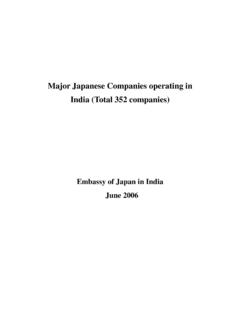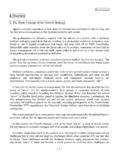Transcription of Bart van Poelgeest, Report of a Study of Dutch Government ...
1 Bart van Poelgeest, Report of a Study of Dutch Government Documents on the Forced Prostitution of Dutch Women in the Dutch east indies during the japanese Occupation, Unofficial Translation . 24th January, 1994 . Introduction and summary In August 1993, the Minister for Foreign Affairs and the Minister of Welfare, Health and Cultural Affairs commissioned a Study into the forced prostitution of Dutch women during the japanese occupation of the Dutch east indies . The Study was to result in a list of the documents kept in Government archives, an analysis and summary of the information contained in them and a detailed list of sources. Access to and information on such documents had been requested on a number of occasions, but, in view of the provisions of the Government Information (Public Access) Act concerning the protection of privacy, public access to them could.
2 Not always be granted. The Minister for Foreign Affairs and the Minister of Welfare, Health and Cultural Affairs therefore felt that an internal Study was called for. For the purposes of this Study , the official documents drawn up by the various Government bodies responsible for investigating, prosecuting and trying war criminals and collaborators in the Dutch east indies were consulted. Forcing women into prostitution was regarded by the Government of the Dutch east indies as a war crime and material on the subject was therefore collected by the various Government bodies concerned. The annex contains an overview of the archives and index numbers of the documents consulted.
3 These documents consist largely of statements submitted by witnesses, victims and suspects and a number of judgements, with the relevant documents, of the temporary war tribunal at Batavia, which was responsible for trying war criminals and collaborators. As a result, accounts of personal experiences - with the exception of letters used as evidence which were encountered in the case files - were not consulted for the purposes of this Study . However, there is no reason to suppose that the overview presented below would have been significantly different had such sources been used. The Study shows that during the japanese occupation, the japanese military forces or military authorities were responsible for procuring the services of prostitutes for japanese soldiers and civilians on the five large islands and a number of the smaller islands of the Dutch east indies .
4 The women involved were not only of indigenous origin but also European DDutch and Indo- Dutch ). The extent to which these women were forced into prostitution or provided their services voluntarily could only be established with any certainty if sufficient information were available on the general and specific circumstances in which they were recruited and on ensuing events. However, the term "voluntary" must generally be seen as relative within the context of the japanese occupation and the circumstances in the internment camps, where the cruelty of the guards and extreme food shortages led to disablement, chronic illness and a very high death rate among the internees.
5 The financial and social circumstances of the European women living outside the camps were equally dire. In such circumstances, the women who agreed to the proposals put to them - after having been provided with insufficient information or threatened with action on the part of the japanese authorities - could hardly be regarded as acting voluntarily. There are as many cases of European women refusing to agree to the proposals put to them, but refusal was impossible if the japanese authorities applied physical force, and this was how the temporary war tribunal at Batavia interpreted the term "forced prostitution". This interpretation has also been adopted for the purposes of this Report .
6 The Study shows that in recruiting European women for their military brothels in the Dutch east indies , the japanese occupiers used force in some cases. Of the two hundred to three hundred European women working in these brothels, 65 were most certainly forced into prostitution. A brief summary of the findings is given below. I Prostitution For the purposes of this Study , the term prostitution refers to a woman's providing a man with a service of a sexual nature in return for payment and within an establishment, specifically set up for that purpose. A woman's acting as a concubine or working individually as a prostitute does not therefore fall within the meaning of the term prostitution as used in this Study .
7 Prostitution was officially prohibited in the Netherlands and in the Dutch east indies , but occurred, in practice, in both countries. In the years prior to the japanese occupation, the prostitutes in the Dutch east indies were mainly of Indonesian or Chinese origin, although a number of European women were also involved, working either as madams in brothels or as prostitutes in brothels and elsewhere. According to the law applicable in the Dutch east indies at the time, the term European referred not only to the "totoks", or full-blood Dutch , and other persons of European origin, such as Germans, Italians, Hungarians, Russians, Belgians, British etc.
8 , but also to persons of Eurasian and, since the japanese Act of the early 1900s, japanese origin living in the Dutch east indies . In addition to approximately seventy million Indonesians, there were thus approximately three hundred and sixty thousand Europeans in the Dutch east indies , most of whom lived on the island of Java. Prostitution was officially prohibited in Japan too, but, unlike Europe, the practice of visiting brothels was not particularly frowned upon. The rules applicable in this regard to japanese army and navy personnel were different from those applicable to japanese civilians. During the war in China in the 1930s, the occurrence of venereal disease among the troops had led to problems with deployment and the japanese military forces therefore decided to set up military brothels as a preventive measure.
9 In addition to local women, japanese and Korean women - Korea being part of the japanese Empire were recruited for the brothels in China. , II The occupation of the Dutch east indies After the japanese attack on Pearl Harbour, the Netherlands declared war on Japan on 8 December 1941. In January 1942, the first japanese attack was launched on the Dutch east indies and Borneo and Celebes were taken. The japanese army landed on Java on 1 March 1942 and the Dutch east indies capitulated a week later. In the ensuing weeks, Sumatra, the Sunda islands, Timor, the Moluccas and practically the whole of New Guinea were occupied. During the invasion and the start of the occupation, various incidents of rape on the part of japanese soldiers occurred, in, for example, Tarakan, Menado, Bandung, Padang and Flores.
10 In some cases, the japanese military authorities imposed strict disciplinary measures on the culprits. A serious incident occurred at Blora, a place not far from Semarang on Java, when some twenty European women were imprisoned in two houses. For three weeks at least fifteen of their number, including mothers and their young daughters, were raped several times a- day by soldiers passing by :with their regiments. The women protested in vain to the commander of one of these regiments. The situation remained the same until a high ranking japanese officer happened to pass by and put an end to it. The capitulation of 8 March 1942 put an end to the Dutch east indies as an administrative entity.








